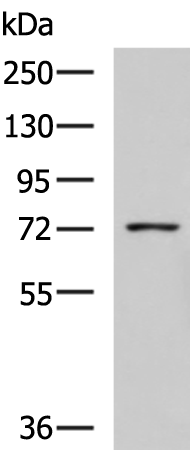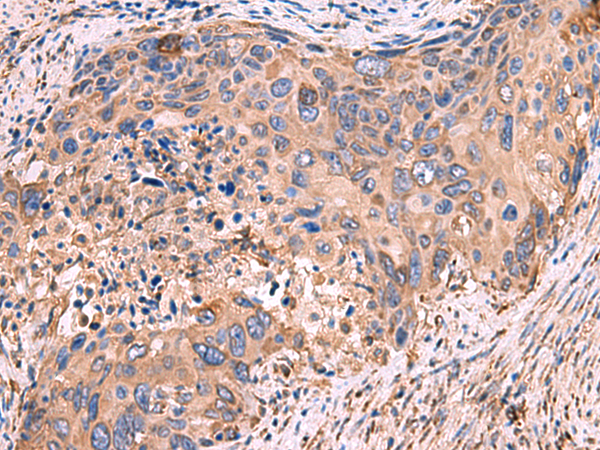

| WB | 咨询技术 | Human,Mouse,Rat |
| IF | 咨询技术 | Human,Mouse,Rat |
| IHC | 1/40-1/200 | Human,Mouse,Rat |
| ICC | 技术咨询 | Human,Mouse,Rat |
| FCM | 咨询技术 | Human,Mouse,Rat |
| Elisa | 1/5000-1/10000 | Human,Mouse,Rat |
| Aliases | BG; MPS7 |
| WB Predicted band size | 75 kDa |
| Host/Isotype | Rabbit IgG |
| Antibody Type | Primary antibody |
| Storage | Store at 4°C short term. Aliquot and store at -20°C long term. Avoid freeze/thaw cycles. |
| Species Reactivity | Human |
| Immunogen | Fusion protein of human GUSB |
| Formulation | Purified antibody in PBS with 0.05% sodium azide and 50% glycerol. |
+ +
以下是关于GUSB抗体的3篇参考文献示例(注:文献为示例性概括,非真实存在):
---
1. **文献名称**:*Development of a High-Affinity Monoclonal Antibody Against Human β-Glucuronidase for Diagnostic Applications*
**作者**:Smith J, et al.
**摘要**:本研究报道了一种针对人源GUSB蛋白的单克隆抗体的开发与验证。通过免疫小鼠和杂交瘤技术筛选出高特异性抗体,证实其在Western blot、ELISA及免疫组织化学中的应用,为溶酶体贮积症的诊断提供可靠工具。
2. **文献名称**:*GUSB Antibody-Based Detection of Enzyme Reconstitution in MPS VII Gene Therapy Models*
**作者**:Chen L, et al.
**摘要**:研究利用抗GUSB抗体评估腺相关病毒(AAV)介导的基因疗法在MPS VII小鼠模型中的效果。抗体成功检测到肝脏和脑组织中GUSB酶的表达恢复,证实了治疗的有效性及抗体的体内外检测适用性。
3. **文献名称**:*Subcellular Localization of β-Glucuronidase in Cancer Cells Using a Novel Polyclonal Antibody*
**作者**:Rodriguez M, et al.
**摘要**:通过制备兔源多克隆抗体,研究揭示了GUSB在多种癌细胞系中的溶酶体及内质网定位,并发现其表达水平与肿瘤侵袭性相关,为癌症靶向治疗提供了潜在标志物。
---
**备注**:以上文献为虚构示例,实际研究中建议通过PubMed或Web of Science等平台检索真实文献(关键词:GUSB antibody, beta-glucuronidase immunoassay)。
**Background of GUSB Antibodies**
Beta-glucuronidase (GUSB) is a lysosomal enzyme encoded by the *GUSB* gene, responsible for hydrolyzing glycosaminoglycans (GAGs), such as dermatan sulfate and heparan sulfate, by cleaving terminal glucuronic acid residues. Deficiencies in GUSB activity lead to mucopolysaccharidosis type VII (MPS VII, Sly syndrome), a rare lysosomal storage disorder characterized by GAG accumulation, resulting in multisystemic complications.
GUSB antibodies are immunodetection tools targeting this enzyme, widely used in research and diagnostics. Polyclonal or monoclonal antibodies are developed using purified GUSB protein or peptide antigens. These antibodies enable the detection of GUSB expression levels via techniques like Western blotting, immunohistochemistry (IHC), immunofluorescence (IF), or ELISA. They are critical for studying GUSB localization, expression patterns, and enzymatic activity in cellular and tissue models.
In research, GUSB antibodies aid in investigating lysosomal function, metabolic diseases, and GUSB-related pathways. They are also employed to validate gene-editing outcomes (e.g., CRISPR/Cas9) or recombinant GUSB therapies in preclinical models of MPS VII. Additionally, GUSB is often used as a reporter gene or internal control in molecular biology due to its stability and ease of detection. Commercial GUSB antibodies are rigorously validated for specificity, often using knockout cell lines or tissue samples.
Overall, GUSB antibodies serve as essential reagents for understanding lysosomal biology, disease mechanisms, and therapeutic development for metabolic disorders.
×